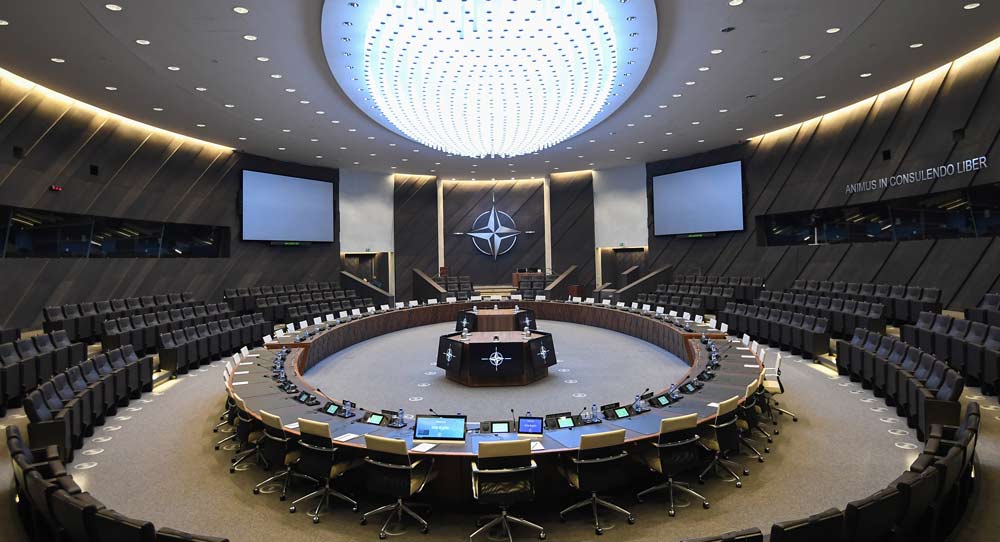Carnegie Europe is on the ground at the 2018 NATO summit in Brussels, offering readers exclusive access to the high-level discussions as they unfold.
**
NATO is a pretty thick-skinned organization. Since its establishment nearly 70 years ago, it has gone through many crises. It has also endured much criticism.
It was assailed by the Kremlin during the Cold War, when NATO protected Western Europe with a conventional might that solidified the transatlantic alliance. It was assailed on its own turf by critics who often accused it of sabre rattling and warmongering.And when the Cold War ended with the collapse of the Berlin Wall in 1989, followed by the collapse of the Soviet Union, NATO was again assailed by its critics. It was time, they argued, for the alliance to pack its bags and shut up shop—just like the Warsaw Pact.
But the difference between the Warsaw Pact and NATO was that members were coerced into the former organization, while after 1989 former communist countries queued to join NATO. That phenomenon continues to this day. Georgia and Ukraine, Macedonia and other countries in the Western Balkans want to join the alliance. It’s that popularity, that attraction of NATO, that doesn’t seem to have occurred to U.S. President Donald Trump.
For those countries wanting to join NATO, it is about being placed under a special security umbrella. It is about being protected by the United States, Europe’s security guarantor. It is about wanting to be safe. NATO’s decision in 1999 to bomb Serb targets in order to stop the ethnic cleansing of Albanians in Kosovo would probably not have happened without the cajoling from London and Washington. That mission ended a war in Europe’s own back yard.
Later, Russia’s invasion of Georgia almost a decade ago and its illegal annexation of Crimea, followed by its invasion of parts of Eastern Ukraine in 2014, gave most NATO members a new sense of purpose. They see Russia as their foe, which is why the alliance has decided to deploy troops to Poland and the Baltic States. It is about being safe.
Were it as clear-cut as that.
Trump sees NATO not as an organization that provides safety but one that should give value for money.
Trump sees NATO not as an organization that provides safety but one that should give value for money. Trump sees NATO not as an organization that provides safety but one that should give value for money. He has assailed NATO because he believes that allies are free-riding on the back of the United States; that they take America’s security guarantee for granted. He’s right. NATO’s European allies are dependent on the United States. And they have become dependent in a way that led to a kind of intellectual neglect or laziness about their own perception of security and defense.
They have, for instance, been too slow to share expensive resources. They have been reluctant to debate important, geostrategic issues such as Iran or the role of Beijing in the South China Sea. They have played a marginal role, to say the least, in the Middle East. And when it comes to upholding basic values of democracy and human rights among its own members, the alliance has little to boast about.
NATO—and this includes the United States—is not good at admitting mistakes, not that other organizations are either.
Above all, NATO—and this includes the United States—is not good at admitting mistakes, not that other organizations are either.
Its long and costly mission in terms of casualties and financial outlays has not brought stability to Afghanistan. Far from it. The consequences of its mission in Libya, which exposed NATO’s weak capabilities, turned from a responsibility-to-protect mandate to what amounted to regime change. The aftermath needs no clarification.
Trump, however, is not the first American president to criticize NATO allies for its shortfalls in military capabilities and for failing to spend enough on defense. This criticism been leveled against NATO for several years.
But the difference this time round is that Trump is implicitly questioning NATO’s role, just as he has questioned the role—if not the relevance—of other multilateral organizations. He wants value for money, however much that can be qualified and quantified when it comes to putting a price on security and maintaining the transatlantic relationship.
Trump is implicitly questioning NATO’s role, just as he has questioned the role—if not the relevance—of other multilateral organizations.
In that context, this special relationship between Europe and the United States is at stake. This relationship has always been about the West’s security, despite all the bitter disputes inside NATO. It survived these crises because its European allies knew and know that they cannot (yet) defend themselves.
They also overcame these crises because of the decades-long resilience that has been built up inside the alliance. It was the assumption that NATO was sort of eternal. Well, that’s not a given, as Jens Stoltenberg, the alliance’s secretary general himself said. In short, Trump’s criticism of NATO is not just about money or free-riding. It’s about NATO’s relevance to his view of the world. The allies better have an answer to justify that relevance when they meet the U.S. president in Brussels this week.








